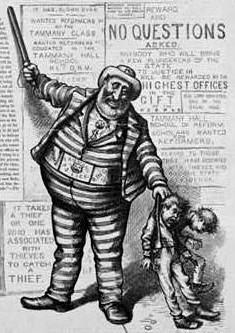Posted by GET NY on 18:54:18 12/22/04
Brooklyn Politics
Erik Engquist
Park Slope Courier
November 22, 2004
HARPER'S HITS HYNES: A magazine article more than a year in the making has finally been published by Harper's Magazine, bringing the sordid prosecution of Brooklyn's felonious voter John O'Hara to a nationwide audience.
What was the writer's take'? Well, let's just say that Brooklyn District Attorney Joe Hynes, Assemblyman Jim Brennan, and his chief of staff John Keefe probably won't be giving Harper's subscriptions this holiday season.
Many of the details of O'Hara's case had been published before in local newspapers and the New York dailies. But the author of the Harper's piece, former Park Slope resident Christopher Ketcham, did uncover one odd piece of information that somehow never came out during the eight years O' Hara's case trudged through the legal system:
In a narrow, technical sense at least, Hynes was inadvertently committing the very crime for which he prosecuted O'Hara.
O'Hara was convicted of being registered to vote from an address other than his primary residence. Yes, that's a crime, even though it's done routinely by thousands of New Yorkers. Including, according to Harper's. Joe Hynes.
It happened when Hynes was in between residences. He was moving from 317 East 17th Street in Flatbush to a co-op in Bay Ridge.
A buff card on file at the Board of Elections reveals that on May 7, 1996, Hynes's registration changed to 210 Joralemon Street. That's the Brooklyn Municipal Building, Hynes's office at the time. It is not a legal residence.
One month later, Hynes launched his investigation of O'Hara, who'd registered to vote from his girlfriend's address in Sunset Park, 14 blocks away from his longtime apartment.
On October 21, 1996. O'Hara was indicted.
Eight days later, Hynes's voting address was changed to his new Bay Ridge co-op.
So during the entire period Hynes was investigating and indicting O'Hara, he was allegedly not in comphance with the same law.
Hynes's spokesman told us that Hynes's registration was changed without his knowledge. The D.A., while waiting to close on his Bay Ridge property, filed a change of address form with the Postal Service so that his Flatbush-bound mail would go to his office. By law, the Postal Service notified the Board of Elections, who changed Hynes's voter registration by photocopying his signature from a previous huff card.
Our guess is the same thing happened when Hynes filed another change of address form upon moving into his new apartment.
We should note that unhke O'Hara, who was convicted both for registering and for voting from the wrong address, Hynes did not actually vote while registered at the Brooklyn Municipal Building, even though there was a Democratic primary during that time.
The bigger question is, Why did he spend eight years and probably over SI million to nail O'Hara? Why did he assign a highly paid top prosecutor, who usually handles murders and other serious crimes, to O'Hara's case from beginning to end?
O'Hara is convinced he was prosecuted on Assemblyman Brennan's request. Brennan had come to despise O'Hara, who ran frequently for elected office in Sunset Park, annoying the political establishment in the process.
By the mid 1990s, though, O'Hara's vote totals had shriveled and he had long ceased to be a viable candidate. He was an Irish guy running in heavily Latino Sunset Park. We can think of only one reason Brennan would have asked that O'Hara be punished: because he could.
The Harper's article suggests that Brennan was corrupted by machine politics, even though he's long portrayed himself as an opponent of it.
"As so often happens, Brennan's reform soon became a machine of its own." Ketcham wrote.
The animosity between Brennan and O'Hara came to a head on September 10, 1996, the date of the Democratic primary. O'Hara was once again a hopeless candidate for the Assembly and his girlfriend was handing out campaign fliers when she had a run-in with Keefe, Brennan's top aide.
"According to O'Hara's girlfriend, it was Brennan himself who piloted the car in which Keefe fled after tearing up her posters and knocking her to the ground," the article said.
Harper's reported that Keefe was charged with assault and sex abuse in the third degree but was a no-show at court hearings. While the case was adjourned for a year, the primary witness moved to Florida. Keefe then pleaded to a minor harassment charge, according to the magazine.
Keefe told us a very different story, which wasn't reported by Ketcham because Keefe and Brennan refused to speak with him.
"I tore an O'Hara poster on election day in 1996. 1 did not assault O'Hara's girlfriend, never knocked her to the ground and never missed any court hearings," Keefe wrote in a faxed statement. "This matter was extensively litigated in a civil suit that contained eyewitness testimony, depositions by pohce officers, and an admission by [O'Hara's girlfriend] that her initial, sworn police complaint contained false information. When the arbitrator ruled against [her], she dechned to continue further legal action."
One thing is certain: O'Hara's fate was far worse than Keefe's. O'Hara refused to plead down to a misdemeanor and mocked prosecutors in court. A game of chicken between two proud and stubborn Irishmen ensued, and after three trials, O'Hara was convicted of seven crimes for filing a false registration form and voting five times thereafter.
As a felon, O'Hara was stripped of the law license he'd earned by driving a taxi at night to pay for law school and by passing the bar exam on his sixth try. He was also fined $20,000 and sentenced to 1,500 hours of community service, which he's been serving by cleaning garbage and public toilets along Shore Road.
O'Hara achieved a measure of revenge by appeahng the case 10 times and attracting media attention, resuhing in bad press for Hynes in- a host of newspapers and now a national magazine.
"It's hard to believe that a local story spun out into what it did," O'Hara said.
But does it matter`?
"I think it does. This is Harper's. A quarter of a milhon people read Harper's. They basically portray Hynes to be the epitome of corruption," O'Hara said.
"I think this will have a tremendous impact," he added. "But it's not the type of thing that happens overnight."
Brennan's spokeswoman had not seen the article and could not respond to it. Hynes's spokesman, when asked for further comment, said he hadn't yet read the entire article.
* * *
MISTRIAL FOR HYNES FOE: A mistrial was declared November 8 in the case against former Brooklyn district attorney candidate Sandra Roper when the jury deadlocked. According to a Roper supporter, eight jurors judged Roper not guilty, three had her guilty, and one was undecided.
Roper is due back in court on December l and will likely be tried again by the special prosecutor, since the prosecutor is being paid by the hour. Er, we mean, she'll be tried again in the interests of justice.
Mary Lee Ward, a client of Roper, accused the attorney of ripping her off. Roper claims Ward accused three other attorneys of ripping her off as well, but that Roper alone was prosecuted as retribution for running against D.A. Joe Hynes in 2001.
Hynes has said he turned all four cases over to the same special prosecutor, Maranda Fritz. But a Roper supporter told us only the prosecution of Roper was authorized, and that the other three cases were included for informational purposes only.
The bar association's grievance committee investigated Ward's complaint against Roper and found it without merit, according to Roper.
Even though Hynes is not handling the prosecution, Roper supporters still blame him for referring the case (which they say has no merit) to a special prosecutor. They note that Hynes has a history of using his position to punish his political enemies, such as John O'Hara, the only person prosecuted for illegal voting since Susan B. Anthony, and John Phillips, a former judge whose assets were frozen after he announced he would run against Hynes.
Hynes has said Phillips was suffering from dementia when Hynes's office investigated whether Phillips might have been victimized by a con game. Hynes's office did participate in Phillips's mental competency hearing, but it was not his office that put Phillips's assets in the control of a guardian, Hynes told the New York Post in February.
* * *
Follow Ups:





